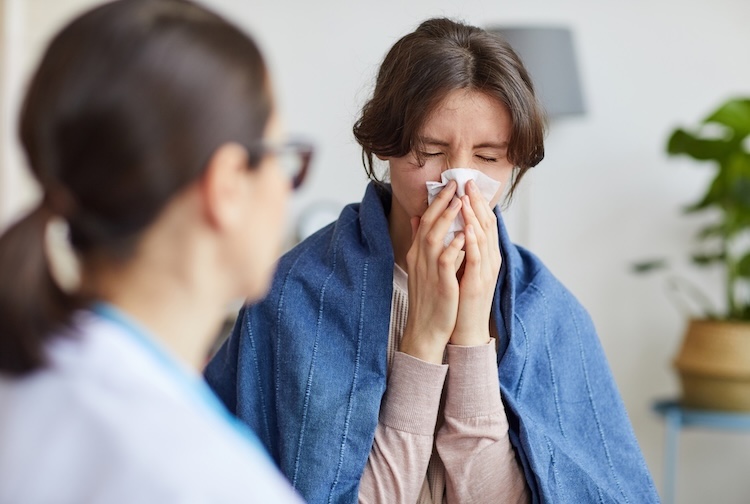Are your flu symptoms life-threatening? Here’s when to go to the emergency department
VCU Health experts share how you can tell if flu symptoms may need hospital care or a call to your primary care provider.
September 17, 2025 According to the Centers for Disease Control and Prevention, about 470,000 people in the United States were hospitalized because of the flu in 2024. (Getty Images)
According to the Centers for Disease Control and Prevention, about 470,000 people in the United States were hospitalized because of the flu in 2024. (Getty Images)
By Sara McCloskey-Nieves
When piles of used tissues begin to overflow in the waste basket and no amount of over-the-counter medicine helps – what do you do?
Being stuck in bed with influenza (flu) is no joke. While the respiratory virus typically lasts 3 to 7 days and can be treated at home, some experience serious symptoms that require emergency medical attention. In fact, about 470,000 people in the United States wound up in the hospital in 2024 because of this annual illness.
But how sick is sick enough to go to the emergency department (ED)?
VCU Health’s leading experts in infectious diseases and emergency medical care know that you want to stay healthy and safe during respiratory virus season. They share tips on where to go for medical care depending on your flu symptoms.
What are common flu symptoms?
Flu symptoms often come up abruptly, compared to colds which are more gradual.
Common flu symptoms include:
- Fever
- Aches
- Chills
- Chest discomfort, cough
- Headache
In terms of prevention: flu shots are the best proven way to prevent severe illness. Flu shots are updated each year to better protect you from the most common variants circulating.
Washing your hands with soap and water, staying home when you’re sick and coughing and sneezing into tissue or your upper sleeve also help to stop the spread of respiratory illnesses.
What complications can happen from the flu?
Some people may develop other illnesses after catching the flu, like pneumonia, bronchitis or sinus or ear infections. More serious complications can be triggered, such as inflammation of the heart (myocarditis), brain (encephalitis) or muscle tissues (myositis, rhabdomyolysis) and organ failure.
Are there warning signs for flu complications? Should I go to the emergency department if I experience these symptoms?
Signs of flu complications developing are slightly different between adults and children. If you or someone in your household experiences these symptoms, you should go to the ED or seek urgent care.
For adults:
- Difficulty breathing or shortness of breath
- Persistent pain or pressure in the chest or abdomen
- Persistent dizziness, confusion
- Seizures
- Not urinating
- Severe muscle pain
- Severe weakness or unsteadiness
- Fever or cough that improve but then return or worsen
- Worsening of chronic medical conditions
For children:
- Heavy breathing where the ribs are easily seen
- Fast breathing that makes eating/drinking difficult
- Blue color around lips and face
- Vomiting all food and drink
- Dehydration/no pee (less than 3 wet diapers or bathroom trips/day)
- Excessive irritability or sleepiness
Emergency departments are equipped to handle more serious, complex treatments, such as procedures requiring sedation, IV fluids or special equipment.
Emergency departments are open 24 hours, 7 days a week. VCU Medical Center's emergency department has highly trained nurses and emergency physicians who practice the latest evidence-based medicine and is the training ground for our future emergency health care workforce.
When should I go to an urgent care clinic or primary care doctor for the flu?
If you have mild symptoms, it is best to stay home. Over-the-counter medications are often enough for healthy adults with mild symptoms. You should get medical attention if your symptoms don’t improve after a week or if they get worse and return with a fever.
If you are part of a group that is at high-risk of getting severely sick (i.e. young children, older adults, pregnant people, have a weakened immune system or have other chronic conditions), you should go to the doctor within 48 hours of experiencing symptoms to discuss whether there would be benefit for you to be placed on antiviral medication. This medication is not effective after two days of being sick.
For children, you should contact a pediatrician or go to urgent care if they:
- Have a high fever (above 100.4) and are under 3 months of age
- Start to show signs of dehydration (not peeing regularly)
- Have a cough that gets worse or causes trouble breathing
- Uncharacteristically refuse to eat/drink/breastfeed/bottle-feed
Why shouldn’t I go to the emergency department if my symptoms aren’t life-threatening?
While we are always ready to help, some medical concerns might not need to be treated urgently or can wait a day for a doctor's appointment.
If people with non-urgent medical needs head to an ED, they may have longer wait times. That’s because the ED at VCU Medical Center treats the sickest and most severely injured people first.
What should I do if I am not sure where to get care based on my symptoms?
Ask your primary care provider where to get care based on your medical issues. If you or a loved one has a medical emergency, go to your nearest ED or call 911.




